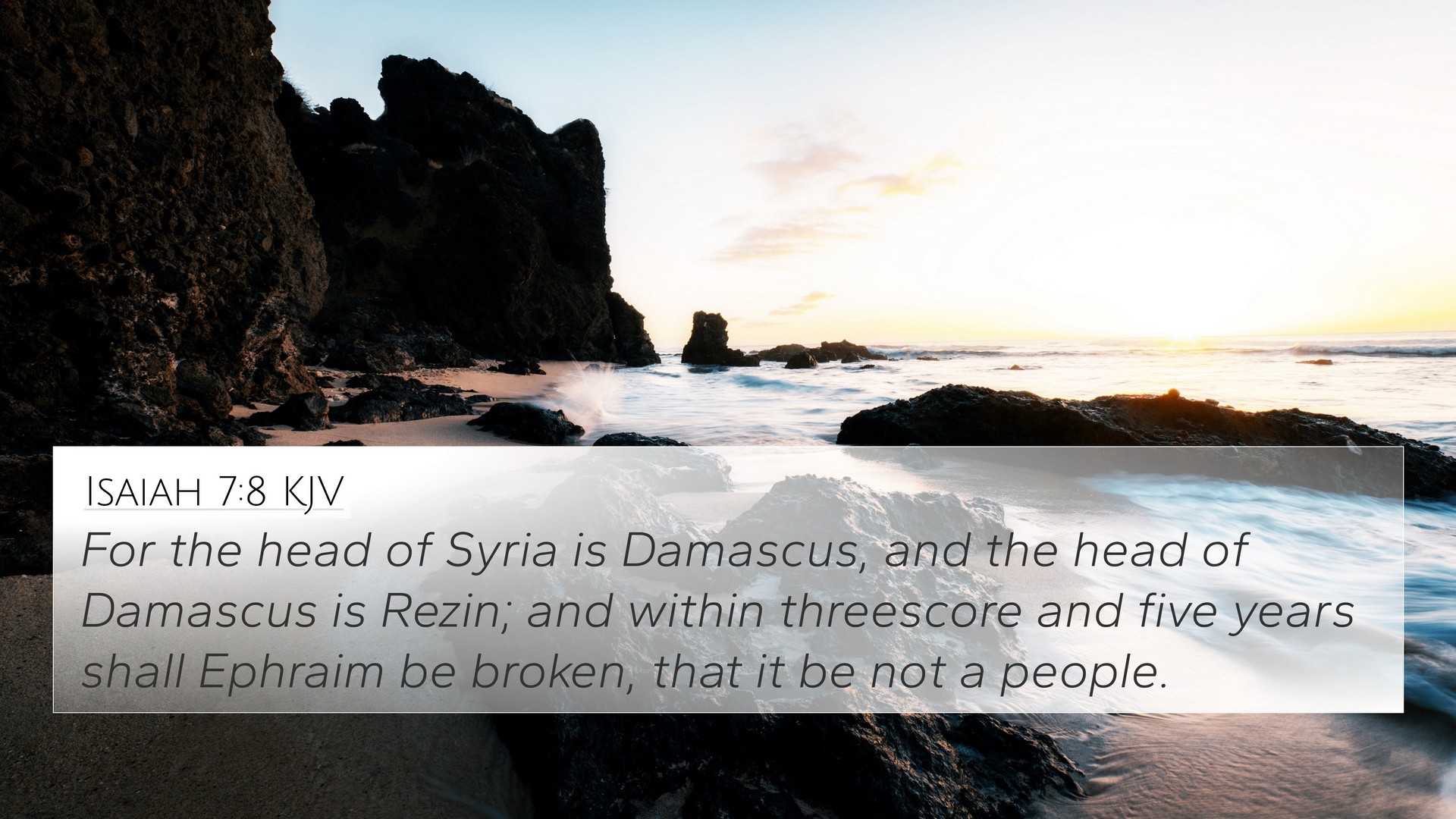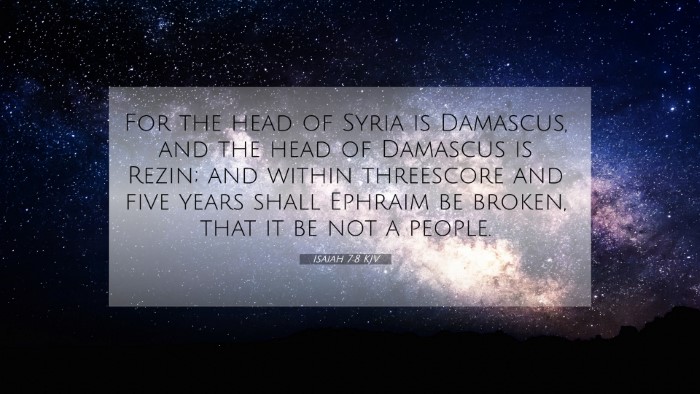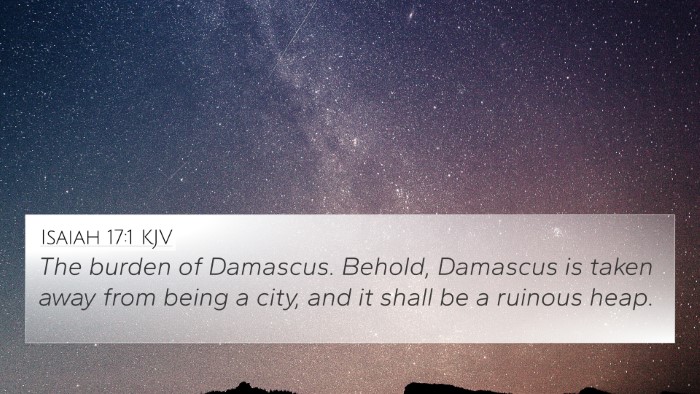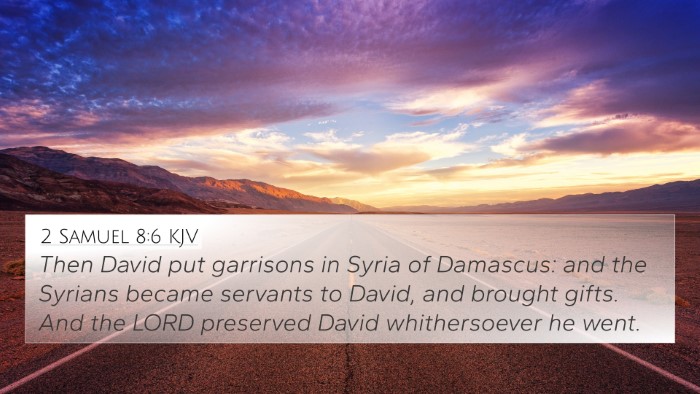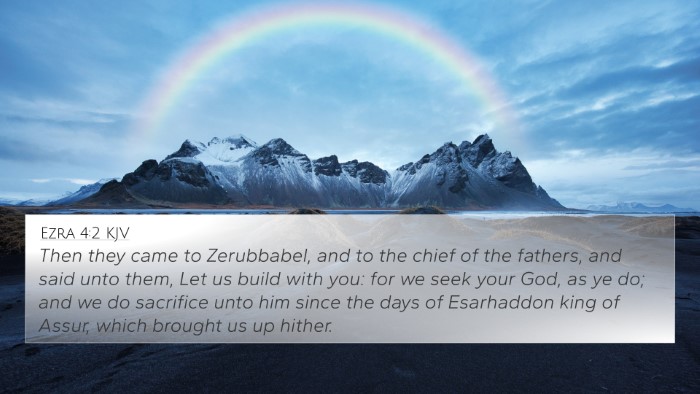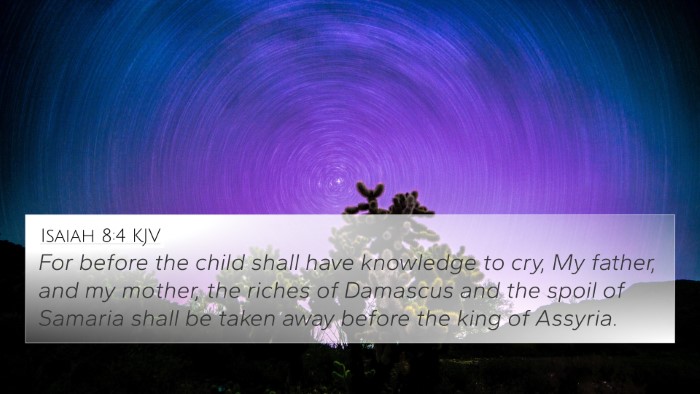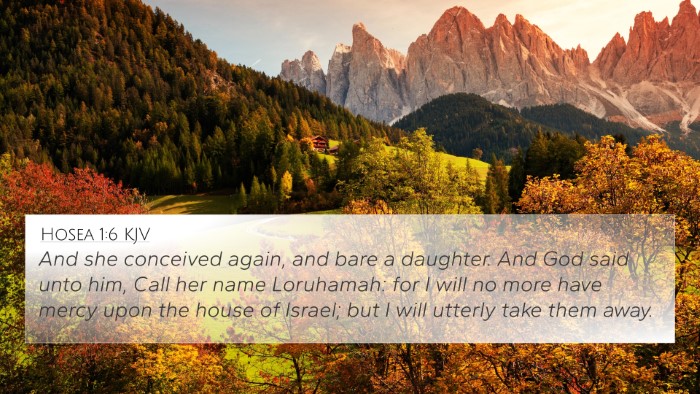Understanding Isaiah 7:8
Isaiah 7:8 (KJV): "For the head of Syria is Damascus, and the head of Damascus is Rezin; and within threescore and five years shall Ephraim be broken, that it be not a people."
Summary of the Verse
Isaiah 7:8 reveals a prophetic message regarding the impending downfall of Ephraim (the northern kingdom of Israel) and emphasizes the power dynamics of neighboring nations, particularly Syria. The verse indicates a timeline within which significant transformation will occur, signaling God's sovereignty in the affairs of nations.
Commentary Insights
-
Matthew Henry's Commentary
Matthew Henry highlights the significance of Damascus as a symbol of Syrian power. He notes that the prophecy speaks directly to the urgency of acknowledging God's authority over both Israel and Syria. Henry argues that the eventual decline of Ephraim serves as a reminder of the consequences of disobedience and the importance of faith in God’s promises.
-
Albert Barnes' Commentary
Albert Barnes delves into the implications of the prophecy's timeline, suggesting that the 65 years represents a divine judgment period. He emphasizes that God's plan involves the eventual destruction of Ephraim, illustrating that nations rise and fall under God's ultimate authority. Barnes also relates this prophecy to the historical context of Assyrian dominance in the region.
-
Adam Clarke's Commentary
Adam Clarke focuses on the specific mention of Rezin and the political landscape of the time. He breaks down the relationships between the various powers—Syria, Israel, and Judah—and points out that the prophecy serves to warn King Ahaz of Judah. Clarke asserts that this serves not only as historical insight but as a theological lesson about reliance and trust in God during tumultuous times.
Cross References
This verse relates to several other scriptures, which enhance its meaning and context:
- Isaiah 8:4: Prophesies the capture of property by the Assyrians from the land of Ephraim.
- 2 Kings 15:29: Documents the fall of Israel and the conquest by Tiglath-Pileser III, linking historical events to Isaiah's prophecy.
- Amos 5:27: Highlights God’s judgment against Israel for their transgressions, paralleling themes of consequence found in Isaiah.
- Micah 1:6: Further condemns the house of Israel and reflects on the destruction of Samaria, relevant to the fate of Ephraim.
- Matthew 2:23: Identifies the region of Galilee (in Ephraim) within New Testament fulfillment passages.
- Jeremiah 31:9: Talks about the hope of Jacob's restoration, contrasting the judgment pronounced in Isaiah 7:8.
- Hosea 5:5: Discusses the pride of Israel leading to their downfall, relating to Ephraim's anticipated fate.
- Luke 2:35: Discusses Simeon’s prophecy about Jesus and connects to the larger narrative of judgment and hope.
- 2 Chronicles 28:5-6: Details Ahaz’s alliances with Syria, illustrating the direct historical background influencing Isaiah's words.
- Ezekiel 37:22: Promises the unification of Israel and Judah, contrasting with the division foreshadowed in Isaiah 7:8.
Thematic Connections
Isaiah 7:8 connects to broader biblical themes:
- Divine Judgment: Reflects on God's justice in punishing nations for their disobedience.
- The Sovereignty of God: Illustrates God’s ultimate control over historical events and nations.
- Hope amidst Judgment: Though the verse speaks of judgment, the context of restoration is a recurring biblical theme.
- The Importance of Faith: The admonition to trust in God rather than political powers.
Other Relevant Themes
This verse can be examined through various methods of cross-referencing and thematic analysis, which can help in understanding God’s overarching plan throughout Scripture. Key practices include:
- Bible Concordances: Utilizing search tools to find related verses and themes.
- Inter-Biblical Dialogue: Engaging with the connections between Old and New Testament themes.
- Comparative Bible Study: Analyzing verses side-by-side to uncover deeper insights.
- Bible Cross-Reference Guides: Employing guides to trace themes like divine judgment and restoration.
Conclusion
Isaiah 7:8 serves as a profound reminder of the consequences of turning away from God, while also offering insights into His ultimate purpose. By exploring this verse through various cross-references, thematic connections, and commentary insights, readers can gain a fuller understanding of the biblical narrative and the importance of upholding faith in God amidst challenges.
